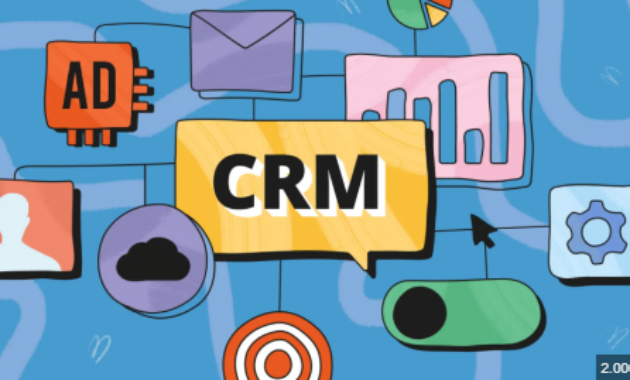Customer Relationship Management (CRM) software has become a vital tool for businesses striving to enhance their customer interactions and streamline operations. This guide delves into the fundamentals of CRM software, its benefits, key features, and considerations for selecting the right solution for your business.
Table of Contents
What is CRM Software?
CRM software is a technology platform designed to manage and analyze customer interactions and data throughout the customer lifecycle. Its primary goal is to improve customer relationships, enhance customer satisfaction, and drive business growth by organizing information and automating processes.
Key Features of CRM Software
- Contact Management: CRM systems provide a centralized repository for customer contact information. This includes details such as names, phone numbers, email addresses, and interaction history, allowing businesses to have a 360-degree view of each customer.
- Sales Management: CRM software helps manage the sales process by tracking leads, opportunities, and sales performance. It often includes tools for managing sales pipelines, forecasting revenue, and automating sales tasks.
- Marketing Automation: Many CRM systems come with built-in marketing automation tools that facilitate email campaigns, social media management, and customer segmentation. This feature helps businesses reach the right audience with targeted messaging.
- Customer Service and Support: CRM software often includes features for managing customer service requests and support tickets. It helps track and resolve customer issues efficiently, improving overall service quality.
- Analytics and Reporting: CRM systems provide robust analytics and reporting capabilities, offering insights into customer behavior, sales performance, and marketing effectiveness. These insights help businesses make data-driven decisions.
- Integration Capabilities: Modern CRM solutions integrate with other business systems such as email platforms, social media, and ERP systems. This ensures a seamless flow of information across different departments.
Benefits of CRM Software
- Improved Customer Relationships: By maintaining detailed records of customer interactions and preferences, CRM software enables businesses to provide personalized experiences, fostering stronger customer relationships.
- Enhanced Efficiency: Automation of repetitive tasks, such as data entry and follow-up reminders, reduces manual work and allows employees to focus on more strategic activities.
- Increased Sales: CRM systems help identify and prioritize high-potential leads, streamline the sales process, and manage sales pipelines more effectively, ultimately boosting sales performance.
- Better Data Management: Centralized data storage ensures that all customer information is accurate and up-to-date, reducing the risk of errors and improving data quality.
- Improved Customer Service: With a comprehensive view of customer interactions and history, support teams can address issues more effectively, leading to higher customer satisfaction and retention.
Choosing the Right CRM Software
When selecting a CRM solution for your business, consider the following factors:
- Business Needs: Assess your specific needs and objectives. Determine which features are essential for your operations, such as sales management, marketing automation, or customer service.
- Scalability: Choose a CRM system that can grow with your business. Ensure it can handle increasing amounts of data and additional users as your business expands.
- Ease of Use: Opt for a CRM that is user-friendly and requires minimal training. An intuitive interface will encourage adoption among your team members.
- Integration Capabilities: Ensure the CRM can integrate seamlessly with your existing systems and applications, such as email, accounting software, and social media platforms.
- Cost: Evaluate the total cost of ownership, including licensing fees, implementation costs, and ongoing maintenance. Consider whether the CRM offers good value for the features provided.
- Customer Support: Reliable customer support is crucial for addressing any issues or questions that may arise. Look for a CRM provider with a strong support team and resources.
Conclusion
CRM software is a powerful tool that can significantly enhance how businesses manage customer relationships and operations. By providing a centralized platform for managing customer interactions, automating processes, and generating valuable insights, CRM systems help businesses improve efficiency, boost sales, and deliver exceptional customer service. When choosing a CRM solution, carefully consider your business needs, scalability, ease of use, integration capabilities, cost, and customer support to ensure you select the best solution for your organization.
Trends in CRM Software
The CRM landscape is continually evolving, driven by advancements in technology and changing business needs. Here are some key trends shaping the future of CRM software:
- Artificial Intelligence (AI) and Machine Learning: AI and machine learning are increasingly integrated into CRM systems to provide advanced analytics, predictive insights, and automation. These technologies help businesses forecast customer behavior, personalize interactions, and automate routine tasks, making CRM systems more intelligent and responsive.
- Customer Experience (CX) Focus: Modern CRM solutions are placing a greater emphasis on enhancing the overall customer experience. This includes tools for managing omnichannel interactions, offering personalized content, and tracking customer journey maps to deliver seamless and engaging experiences.
- Mobile CRM: With the rise of remote work and mobile connectivity, mobile CRM applications are becoming essential. These apps allow sales and service teams to access CRM data and perform tasks from their smartphones or tablets, ensuring productivity and real-time updates regardless of location.
- Cloud-Based CRM: Cloud-based CRM solutions offer flexibility, scalability, and cost-efficiency. Businesses can access their CRM systems from anywhere, at any time, without the need for complex on-premises infrastructure. This trend is also driving the adoption of subscription-based pricing models.
- Integration with Emerging Technologies: CRM systems are increasingly integrating with other emerging technologies such as Internet of Things (IoT) devices, chatbots, and virtual reality (VR). These integrations provide richer data, enhance customer interactions, and offer innovative ways to engage with customers.
- Data Privacy and Compliance: As data privacy regulations become more stringent, CRM software is evolving to ensure compliance with laws such as GDPR and CCPA. Features such as data encryption, consent management, and audit trails are becoming standard to protect customer data and maintain trust.
- Enhanced Analytics and Reporting: The demand for deeper insights and actionable data is driving advancements in CRM analytics and reporting. Enhanced dashboards, real-time reporting, and advanced data visualization tools help businesses make more informed decisions and track performance more effectively.
Implementation Best Practices
To maximize the benefits of your CRM software, consider the following best practices during implementation:
- Define Clear Objectives: Establish specific goals and objectives for your CRM implementation. Whether it’s improving sales efficiency, enhancing customer service, or streamlining marketing efforts, having clear objectives will guide the setup and usage of the CRM system.
- Involve Key Stakeholders: Engage key stakeholders from different departments (sales, marketing, customer service) early in the process. Their input will help ensure that the CRM system meets the needs of all users and that there is buy-in from the entire organization.
- Customize and Configure: Tailor the CRM system to fit your business processes and workflows. Most CRM solutions offer customization options to adapt the software to your specific needs, which can improve user adoption and overall effectiveness.
- Provide Training: Invest in comprehensive training for your team to ensure they are comfortable using the CRM system. Well-trained users are more likely to utilize the system effectively and contribute to its success.
- Monitor and Evaluate: Regularly monitor the performance of your CRM system and gather feedback from users. Evaluate how well the system is meeting your objectives and make adjustments as needed to address any issues or areas for improvement.
- Ensure Data Quality: Maintain high data quality by implementing data entry standards and regular data cleansing practices. Accurate and up-to-date data is crucial for the effectiveness of your CRM system and the insights it provides.
Conclusion
CRM software has become an indispensable asset for businesses aiming to foster strong customer relationships, streamline operations, and drive growth. By understanding the core features, benefits, and trends in CRM technology, businesses can make informed decisions when selecting and implementing a CRM system. Embracing best practices for implementation and staying attuned to evolving trends will help ensure that your CRM software delivers maximum value and supports your organization’s long-term success.
As the CRM landscape continues to evolve, staying informed about new developments and technologies will enable your business to leverage CRM solutions effectively, adapt to changing market conditions, and maintain a competitive edge.




